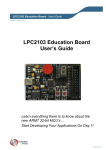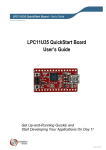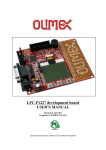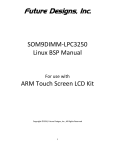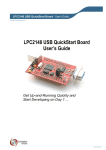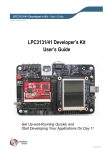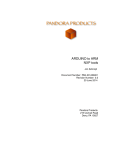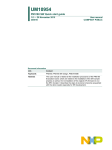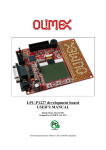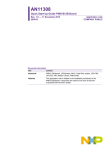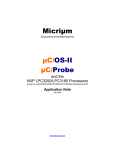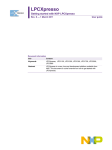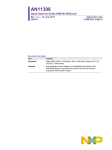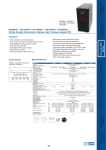Download User`s Manual - Embedded Artists
Transcript
LPCXpresso Prototype Board - User’s Guide Copyright 2012 © Embedded Artists AB LPCXpresso Prototype Board User’s Guide Get Up-and-Running Quickly and Start Developing Your Applications On Day 1! EA2-USG-1003 Rev A LPCXpresso Prototype Board - User’s Guide Page 2 Embedded Artists AB Davidshallsgatan 16 SE-211 45 Malmö Sweden [email protected] http://www.EmbeddedArtists.com Copyright 2005-2012 © Embedded Artists AB. All rights reserved. No part of this publication may be reproduced, transmitted, transcribed, stored in a retrieval system, or translated into any language or computer language, in any form or by any means, electronic, mechanical, magnetic, optical, chemical, manual or otherwise, without the prior written permission of Embedded Artists AB. Disclaimer Embedded Artists AB makes no representation or warranties with respect to the contents hereof and specifically disclaim any implied warranties or merchantability or fitness for any particular purpose. Information in this publication is subject to change without notice and does not represent a commitment on the part of Embedded Artists AB. Feedback We appreciate any feedback you may have for improvements on this document. Please send your comments to [email protected]. Trademarks All brand and product names mentioned herein are trademarks, services marks, registered trademarks, or registered service marks of their respective owners and should be treated as such. Copyright 2012 © Embedded Artists AB LPCXpresso Prototype Board - User’s Guide Page 3 Table of Contents 1 Document Revision History 4 2 Introduction 5 2.1 Features 5 2.2 ESD and Handling Precaution 5 2.3 Other Products from Embedded Artists 5 2.3.1 Design and Production Services 5 2.3.2 OEM / Education / QuickStart Boards and Kits 6 3 Getting Started 7 3.1 LPCXpresso 7 3.2 Initial Preparation – Soldering of Connectors 7 3.3 Board Powering 10 3.4 Main Components 11 3.4.1 LPCXpresso / mbed Signals 11 3.4.2 100 mil Pitch Holes 13 3.4.3 50 mil Pitch Holes 14 3.4.4 50 mil Pitch SOIC Components 15 3.4.5 0.65 mm Pitch SSOP Components 16 4 Mechanical Dimensions Copyright 2012 © Embedded Artists AB 17 LPCXpresso Prototype Board - User’s Guide Page 4 1 Document Revision History Revision Date Description PA1 2010-02-02 First complete version. PA2 2011-05-20 Added errata information (silk screen print) in section 3.4.1. A 2012-01-18 Added clarification that pin names refer to LPC1114 and LPC1343 (and not to for example LPC1769 and LPC1227). Copyright 2012 © Embedded Artists AB LPCXpresso Prototype Board - User’s Guide Page 5 2 Introduction Thank you for buying Embedded Artists’ LPCXpresso Prototype Board, designed for the LPCXpresso Board (for many different target boards in the LPC1xxx family) and the mbed module from NXP’s. This document is a User’s Guide that describes the LPCXpresso Prototype Board hardware design. The general focus will be for the LPCXpresso boards but differences for the mbed module will be noted. 2.1 Features The LPCXpresso Prototype Board makes it possible for you to get started with experiments and prototyping immediately with the LPCXpresso Board. The LPCXpresso Prototype Board can also be used together with the mbed module. The features of the LPCXpresso Prototype Board are: All signals on expansion connector can be accessed easily Includes two 1x27 pin lists and two 1x27 headers Note that these must be manually soldered to the LPCXpresso (LPC1xxx) board and the LPCXpresso Prototype board, respectively. Large prototype area with 100mil pitch holes Prototype area with 50mil pitch holes Prototype area for 50 mil pitch SOIC components Prototype area for 0.65 mm pitch SSOP components Dimensions: 148 x 120 mm 2.2 ESD and Handling Precaution Please note that the LPCXpresso Prototype Board itself is not sensitive to ESD (Electro-Static Discharge) simply because there are no components mounted on the board. However, as soon as the board contains prototype electronics and/or have the LPCXpresso Board mounted, pay attention to ESD precaution. Make it a habit to always first touch a ground point (for example the metal surface of the USB connector on the LPCXpresso Board) for a few seconds with both hands before touching any other parts of the boards. That way, you will have the same electrical potential as the board and therefore minimize the risk for ESD. Note that Embedded Artists does not replace boards that have been damaged by ESD. 2.3 Other Products from Embedded Artists Embedded Artists have a broad range of low cost LPC1xxx/LPC2xxx/LPC3xxx/LPC4xxx based boards developed for prototyping / development as well as for OEM applications. Modifications for OEM applications can be done easily, even for modest production volumes. Contact Embedded Artists for further information about design and production services. 2.3.1 Design and Production Services Embedded Artists provide design services for custom designs, either completely new or modification to existing boards. Specific peripherals and I/O can be added easily to different designs, for example, communication interfaces, specific analog or digital I/O, and power supplies. Embedded Artists has a broad, and long, experience in designing industrial electronics in general and with NXP’s LPC1xxx/LPC2xxx/LPC3xxx/LPC4xxx microcontroller families in specific. Our competence also includes wireless and wired communication for embedded systems. For example IEEE802.11b/g (WLAN), Bluetooth™, ZigBee™, ISM RF, Ethernet, CAN, RS485, and Fieldbuses. Copyright 2012 © Embedded Artists AB LPCXpresso Prototype Board - User’s Guide 2.3.2 Page 6 OEM / Education / QuickStart Boards and Kits Visit Embedded Artists’ home page, www.EmbeddedArtists.com, for information about other OEM / Education / QuickStart boards / kits or contact your local distributor. Copyright 2012 © Embedded Artists AB LPCXpresso Prototype Board - User’s Guide Page 7 3 Getting Started This chapter contains information about how to get acquainted with the LPCXpresso Prototype Board. Please read this section first before you start using the board - it will be worthwhile! 3.1 LPCXpresso The main source of information about the LPCXpresso LPC1xxx boards as well as the LPCXpresso Debugger/IDE is http://www.nxp.com/lpcxpresso. This site contains a lot of information, like introduction videos, getting started manual, a forum, link to IDE download and much more information that is related to LPCXpresso. 3.2 Initial Preparation – Soldering of Connectors The LPCXpresso Prototype Board is delivered with two pin lists (male) and two headers (female). See Figure 1 to identify the different connectors. LPCXpresso Prototype Board Two 1x27-pos headers (female) connectors Two 1x27-pos pin lists (male) connectors Figure 1 – LPCXpresso Prototype Board Kit Content The pin lists shall be soldered onto the backside of the LPCXpresso LPC1xxx board (as seen in Figure 2 and Figure 3) before it can be used with the LPCXpresso Prototype Board. Note that the different target boards look a little bit different but all have the edge connectors like shown in the picture below. Figure 2 – LPCXpresso Board with Pin Lists Facing Up Copyright 2012 © Embedded Artists AB LPCXpresso Prototype Board - User’s Guide Page 8 Figure 3 – LPCXpresso Board with Pin Lists Facing Down The headers shall be soldered onto the front side of the LPCXpresso Prototype Board, as seen in Figure 4. Figure 4 – LPCXpresso Prototype Board with Headers Facing Up Figure 5 shows the LPCXpresso Board mounted in the LPCXpresso Prototype Board. Copyright 2012 © Embedded Artists AB LPCXpresso Prototype Board - User’s Guide Figure 5 – LPCXpresso Prototype Board with LPCXpresso Board Mounted Copyright 2012 © Embedded Artists AB Page 9 LPCXpresso Prototype Board - User’s Guide 3.3 Page 10 Board Powering The LPCXpresso Prototype Board distributes voltages according to Figure 6. The red rectangles illustrate the holes where GND-potential is available. All the areas are connected. The green rectangles illustrate where +3.3V-potential is available. All the areas are connected. The pcb silk screen also indicates where GND and +3.3V is available. Figure 6 – Board Powering Note that the “+3.3V” potential is about +3.3V, but slightly lower due to voltage drop from a back-feed protection diode on the LPCXpresso Board if the +3.3V is generated on the LPCXpresso Board. These are the powering options for LPCXpresso: The +3.3V can be generated from the LPCXpresso Board. o Power can come from a PC via the USB-interface for LPC-LINK. o Power can alternatively come from an external +5V source (that connects to VIN on the LPCXpresso Board). The +3.3V can come from an external source. Note that this power source must be able to handle that the LPCXpresso Board also can power the +3.3V. These are the powering options for mbed: The +3.3V can be generated from the mbed module. o Copyright 2012 © Embedded Artists AB Power can come from a PC via the USB-interface on the module. Power can alternatively come from an external +5V source (that connects to VIN on the module). LPCXpresso Prototype Board - User’s Guide 3.4 Page 11 Main Components This section describes the different areas of the LPCXpresso Prototype Board. 3.4.1 LPCXpresso / mbed Signals All signals on the LPCXpresso Board / mbed module are accessed easily just right next to the headers (marked with green rectangles in Figure 7). There is also silk screen text on the pcb listing the signal names. LPCXpresso names are listed outside of the connector area and mbed signal names are listed in-between the headers. Figure 7 – LPCXpresso / mbed Signals Copyright 2012 © Embedded Artists AB LPCXpresso Prototype Board - User’s Guide Page 12 There are two errors in the silk screen related to the mbed pinning (in-between the headers). Rows shall be switched, upper: VB lower: nR (reset) Rows shall be switched, upper: UART3-TX/SDA lower: UART3-RX/SCL Figure 8 – LPCXpresso / mbed Signal name errata Also note that all pin names refer to LPC1114/LPC1343 pin naming. The board was originally designed for these processors. The LPC1769 and LPC1227 pin names are completely different. Check the respective schematic for converting pin names. Copyright 2012 © Embedded Artists AB LPCXpresso Prototype Board - User’s Guide 3.4.2 Page 13 100 mil Pitch Holes A large part of the board is covered with 100mil pitch holes, as indicated in the red area in Figure 9. The holes are 1.09 mm in diameter. Figure 9 – 100 mil Hole Areas Copyright 2012 © Embedded Artists AB LPCXpresso Prototype Board - User’s Guide 3.4.3 Page 14 50 mil Pitch Holes Figure 10 indicates, in the red area, a prototype area with 50 mil pitch holes. The holes are 0.71 mm in diameter. Figure 10 – 50 mil Hole Areas Copyright 2012 © Embedded Artists AB LPCXpresso Prototype Board - User’s Guide 3.4.4 Page 15 50 mil Pitch SOIC Components The two red rectangles in Figure 11 indicate prototype areas for 50 mil pitch SOIC components. The SOIC components can have 3.9mm, 5.3mm or 7.5mm (300 mil) wide bodies. Each pad is accessible via a small hole. Figure 11 – 50 mil SOIC Areas In-between the SOIC pads, there are 0603-sides pads for decoupling capacitors. The upper pad on all positions is connected to GND-potential. The lower pod is not connected to anything. It is supposed to connect to any power supply pin on a SOIC package. Upper pad on all positions is connected to GND. Pad for 0603-sized capacitor – mount what is needed for decoupling. Not connected pad – shall be connected to VCC/VDD of SOIC component to decouple. Figure 12 – 0603 pads in SOIC Area Copyright 2012 © Embedded Artists AB LPCXpresso Prototype Board - User’s Guide 3.4.5 Page 16 0.65 mm Pitch SSOP Components The red rectangle in Figure 13 indicates a prototype area for 0.65 mm pitch SSOP components. Each pad is accessible via a small hole. Figure 13 – 0.65 mm SSOP Areas Copyright 2012 © Embedded Artists AB LPCXpresso Prototype Board - User’s Guide Page 17 4 Mechanical Dimensions Figure 14 contains a picture of the board that includes mechanical measures. The connector positions are also marked. The x,y coordinates are given in mil and mm. Pin 1 of Header (2566, 4397) mil [65.17, 111.68] mm Mounting hole (310, 4714) mil [7.87, 119.75] mm Pin 1 (2366, 4397) mil [60.09, 111.68] mm Mounting hole (310, 390) mil [7.87, 9.91] mm Figure 14 – LPCXpresso Prototype Board Mechanical Dimensions Copyright 2012 © Embedded Artists AB Pin 28 of Header (3466, 4397) mil [88.03, 111.68] mm Pin 28 (3666, 4397) mil [93.11, 111.68] mm Mounting hole (5722, 4714) mil [145.33, 119.75] mm Mounting hole (5722, 390) mil [145.33, 9.91] mm

















